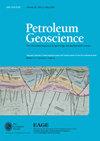The impact of heterogeneous salt velocity models on the gross rock volume estimation: an example from the Santos Basin pre-salt, Brazil
IF 2.1
4区 地球科学
Q3 GEOSCIENCES, MULTIDISCIPLINARY
引用次数: 3
Abstract
The thick and heterogeneous salt section in the Santos Basin, offshore Brazil, imposes great challenges in accessing the pre-salt hydrocarbon reservoirs, especially in relation to seismic imaging, signal quality and depth positioning. Some problems arise from the current velocity models for the salt section, which, for the majority, assume that the salt is a homogeneous halite layer. In the Santos Basin, the commonly assumed salt – halite – only makes up to 80% of the mineral in this section. The inclusion of other salts as stratification in the velocity models, based on seismic attributes, has achieved good results in the last decade, especially for depth resolution. In this work, we analyse the benefits of different velocity models, considering presence/absence of salt stratification and comparing the gross rock volume above the oil–water contact. The results show a significant effect on the depth resolution of the events, as well as on volume estimation, indicating that the greater the reliability captured by the complex velocity models, the greater the confidence in the resulting volumetric information.非均质盐速模型对总岩石体积估算的影响——以巴西桑托斯盆地盐前区为例
巴西近海桑托斯盆地的厚盐和非均质盐段在获取盐前油气藏方面带来了巨大挑战,尤其是在地震成像、信号质量和深度定位方面。盐段的当前速度模型产生了一些问题,大多数情况下,该模型假设盐是均匀的石盐层。在桑托斯盆地,通常认为的盐——岩盐——只占该段矿物的80%。在过去的十年里,基于地震属性,在速度模型中加入其他盐类作为分层,取得了良好的效果,尤其是在深度分辨率方面。在这项工作中,我们分析了不同速度模型的好处,考虑到盐分层的存在/不存在,并比较了油水接触上方的总岩石体积。结果显示,对事件的深度分辨率以及体积估计都有显著影响,表明复杂速度模型捕获的可靠性越高,对所得体积信息的置信度就越高。
本文章由计算机程序翻译,如有差异,请以英文原文为准。
求助全文
约1分钟内获得全文
求助全文
来源期刊

Petroleum Geoscience
地学-地球科学综合
CiteScore
4.80
自引率
11.80%
发文量
28
审稿时长
>12 weeks
期刊介绍:
Petroleum Geoscience is the international journal of geoenergy and applied earth science, and is co-owned by the Geological Society of London and the European Association of Geoscientists and Engineers (EAGE).
Petroleum Geoscience transcends disciplinary boundaries and publishes a balanced mix of articles covering exploration, exploitation, appraisal, development and enhancement of sub-surface hydrocarbon resources and carbon repositories. The integration of disciplines in an applied context, whether for fluid production, carbon storage or related geoenergy applications, is a particular strength of the journal. Articles on enhancing exploration efficiency, lowering technological and environmental risk, and improving hydrocarbon recovery communicate the latest developments in sub-surface geoscience to a wide readership.
Petroleum Geoscience provides a multidisciplinary forum for those engaged in the science and technology of the rock-related sub-surface disciplines. The journal reaches some 8000 individual subscribers, and a further 1100 institutional subscriptions provide global access to readers including geologists, geophysicists, petroleum and reservoir engineers, petrophysicists and geochemists in both academia and industry. The journal aims to share knowledge of reservoir geoscience and to reflect the international nature of its development.
 求助内容:
求助内容: 应助结果提醒方式:
应助结果提醒方式:


